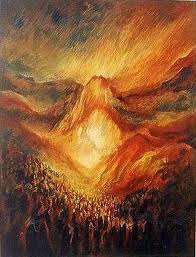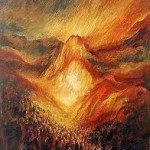After the dramatic and supernatural event at the revelation at Mount Sinai we read the following
“And these are the ordinances that you shall set before them”(Exodus 21:1)
We need to focus on two terms used in our text. The first is” VeEilu-And these are ” and the second is ” Asher Tasim LifneiHem- that you shall set before them”
On the first words ” VeEilu-And these are ” Rashi writes the following;
And these are the ordinances: Wherever it says, “these” -Eleih in the Torah,] the term is used separate from what has been stated previously. Yet when it says “And these-Ve-Eileh,” the term implies an adding to what has been previously stated (Tanchuma Mishpatim 3). Rashi then declares “Just as what has been previously stated (the Ten Commandments)were from Sinai, these too were from Sinai”.
The greater part of the Torah portion of Mishpatim then consists of a description of 53 of the 613 mitzvoth (commandments).We read of a set of ordinances and commandments that range from the laws of the indentured servant, the penalties for murder, kidnapping, assault and theft through an assortment of “civil laws” and declarations relating to the laws warning against mistreatment of foreigners and then to the observance of the Biblical feasts and , and the mitzvah of prayer.
On one level , we can understand Rashi’s comment relating to the need to raise to a lofty level even those commandments that seem so logical and earthbound. We are to follow these dictates not because they “make sense” but rather because they were commanded from on high. We do what we do, not because it “speaks” to us and not because we have found it to be relevant in our lives. We do what we do, because we want to fulfill the will of our Beloved.
Yet there is another layer as well. There is a Hassidic story that I return to constantly and consistently see its relevance in every sphere of our spiritual life.
Rabbi Menachem Mendel of Vitebsk once asked his students “what language does G-d speak?” One student said “Hebrew”. Another said in all languages and another said in “no language”. Rabbi Menachem Mendel answered “you may be all partially correct, yet at the deepest level Man is the language of G-d.“ Man has been given the role of expressing G-d in this world.
We read in psalms ;
Sing to G-d, sing praises to His name; Lift up a song for Him who rides through the deserts, Whose name is Hashem, and exult before Him. A father of the fatherless and a judge for the widows, Is G-d in His holy habitation. G-d makes a home for the lonely; He leads out the prisoners into prosperity, Only the rebellious dwell in a parched land.…( psalm 68:4-6)
If that is G-d’s purpose, then we can choose to become the tools and vessels of that purpose. Every one of the ordinances that G-d reveals after the revelation at Mount Sinai are opportunities for us to become His language and to achieve His purpose. There is nothing more purposeful and fulfilling than to become that vessel of Hashem’s will.
We can now understand the other part of that first verse in our Torah portion,” Asher Tasim LifneiHem- that you shall set before them”.
These words as an introduction for the list of commandments is unusual. This form of description is usually used in the Biblical text describing the preparation of meal for a guest.
Rashi understands that this is to teach us that a description of how we are to live our lives is laid before us like a table set for a guest “you shall set before them,” like a table, set with food and prepared to eat from, [placed] before someone. — [Rashi;Mechilta, Eruvin 54b].
Yet a form of the word LifneiHem is found in another significant verse as well.
“And Abram was ninety-nine years old, and G-d appeared to Abram, and He said to him, “I am the Almighty G-d; walk before Me ( LiFanay) and be wholehearted ..'” (Genesis 17:1) .
Abraham is bidden to be courageous and walk before G-d, not next to Him. Abraham is asked to have the faith to walk into the unknown knowing that G-d is behind him at all times. How then is one to know how to do that?
Obedience to the “the ordinances that you shall set before them”(Exodus 21:1) becomes the roadmap and the vessel to achieve that . Being obedient to the Divine instructions allows one to become the vessel and tools used by Hashem to achieve His purpose.
It allows one to become the “language of G-d”
LeRefuat Yehudit bat Golda Yocheved

